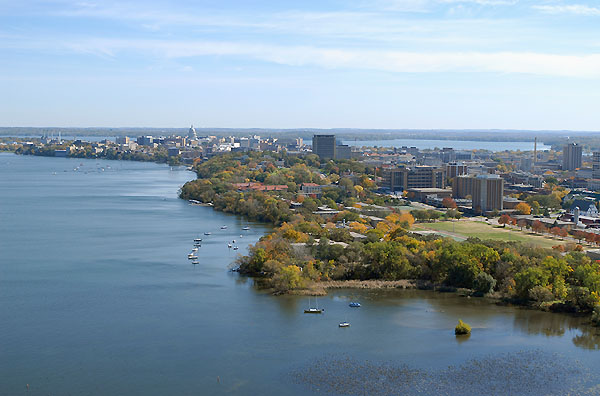BTN.com staff, BTN.com staff, March 15, 2015

During football and basketball games, BTN LiveBIG will spotlight notable examples of research, innovation and community service from around the conference. In-Game stories will provide more background on these features, and the opportunity to view the videos again.
Throughout the Midwest, lakes serve as both a symbol of local pride and an important natural resource for everyone who lives nearby. And Lake Mendota, which sits next to the University of Wisconsin and downtown Madison, is an exemplar of this.
But it has another, unique characteristic: It?s been the ?living laboratory? for what might be the world?s premier site in the field of limnology - or the study of inland waters - for more than a century.
Lake Mendota has played a critical part in combating a major ecological challenge: the proliferation of toxic algae blooms in lakes across the country and beyond. They?re slimy and potent, but the worst thing about algae blooms is that they grow rapidly, thereby creating severe imbalances in marine-life ecosystems, said Steve Carpenter, zoology professor and director of the Center for Limnology at the University of Wisconsin.
?When they die and decompose, they take the oxygen out of the water and that leads to massive fish kill,? he added.
Because algae are naturally occurring and difficult to remove, Carpenter and his team are constantly keeping an eye on this issue in Lake Mendota.
?Every year, we carefully monitor the fish populations, the small animals in the water, the algae in the algae blooms, the animals that live on the bottom, the chemistry of the water and the amounts of water in our lakes,? he said.
By keeping a watchful eye on the lake, Carpenter and other researchers were able to make breakthroughs in figuring out how to deal with this problem - the primary one being management through natural means.
[btn-post-package]?I think our most exciting discovery is that healthy food webs can control algae blooms,? Carpenter said. ?We discovered that grazing consumption of the algae by small animals in the water can also control algae blooms, and if the food web of a lake is healthy, you end up with cleaner water.?
Carpenter and his team are using this to preserve Lake Mendota?s ecosystem so that future generations can enjoy it, learn from it and take pride in it.
?Healthy lakes provide us with everything from clean drinking water to places for recreation, places to fish, and places to simply reflect and enjoy nature,? he said. ?And Lake Mendota is the iconic lake for Madison.?
Watch the one-minute video above to learn more about how the University of Wisconsin?s limnology program is serving Lake Mendota, and vice versa.
By Ashley Lemaine







